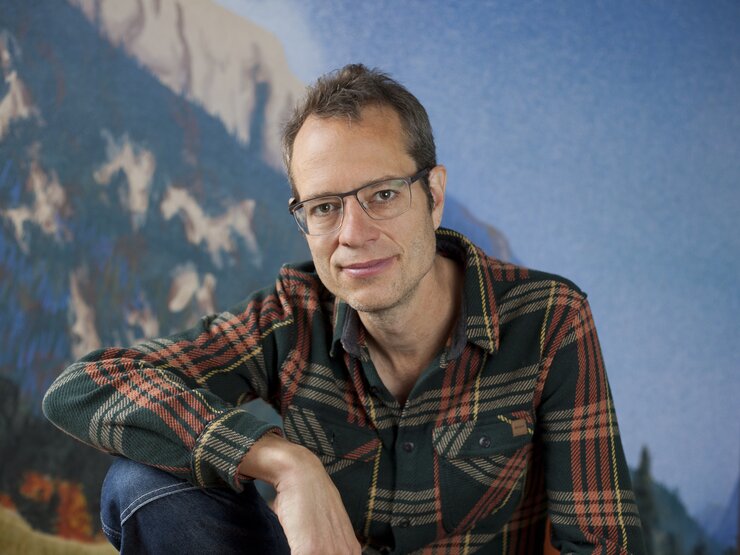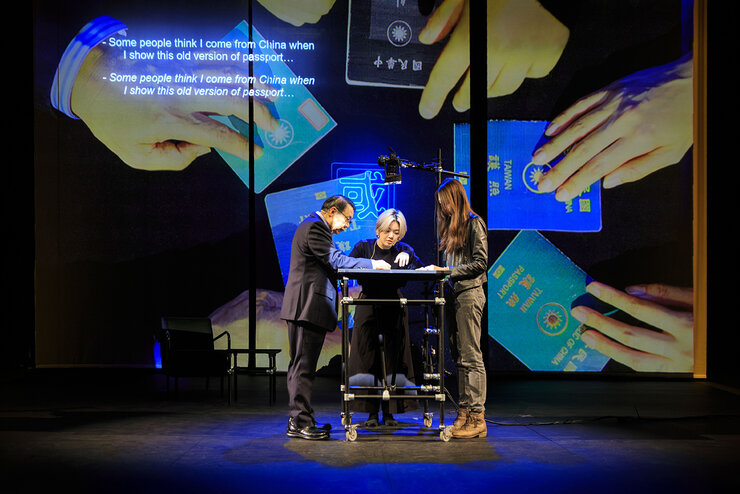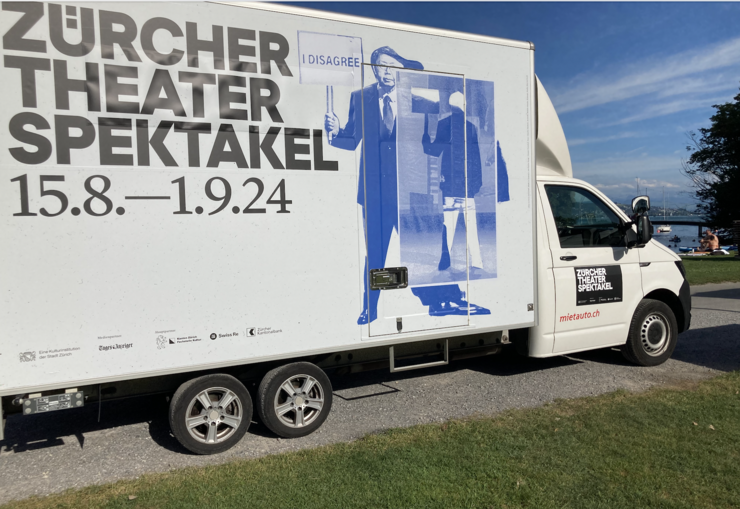
Rimini Protokoll has almost become a synonym for documentary theatre in the German-speaking world. The artists' collective, consisting of Stefan Kaegi, Helgard Haug and Daniel Wetzel, has been creating innovative and multi-layered theatre pieces, installations, interventions, radio plays and other artistic formats since 2000. What characterises Rimini Protokoll is their unique approach to the themes and casting of their works. Instead of hiring traditional actors, they work with so-called «experts of everyday life». This is also the case in their latest play «This is not a message (Made in Taiwan)», which will be shown during the Zürcher Theater Spektakel.

Stefan, it's great that you found time for this interview. What prompted you to write a play about the diplomatic situation in Taiwan and how did you go about your research?
I have always found Taiwan very exciting. I have realised several projects in China and am very connected to the culture there. In Taiwan, however, you realise that democracy prevails, which is evident in many aspects – from urban planning to the artistic milieu, which is very diverse and lively. In any case, I've been to Taiwan for work from time to time for years, for example with our piece «Remote X», which was also invited to the Theater Spektakel some years ago. For «Remote Taipei», we staged a spectacular version that ended on a helipad. It was the first time I worked with Szu-Ni Wen, who is now responsible for the dramaturgy of «This is not a message». She also staged «100% Kaohsiung» for us in 2020 – Kaohsiung is a city in the south of Taiwan – because we couldn’t travel during the pandemic and therefore couldn't stage the play ourselves. So we already had a longer history of collaboration with Szu-Ni.
So I was very happy when the Taipei National Theatre invited me to spend a few months there in 2022. We then tried to find out in advance with Szu-Ni which experts might be suitable to tell the story of Taiwan's precarious diplomatic situation.
Can you explain this in more detail?
Taiwan has a unique political status, which can lead to very absurd situations. I once received an invitation from the Trade Office of Swiss Industries and didn't understand what I was supposed to do at such a trade centre. The woman on the other end of the line explained to me that this was just the code name for the Swiss de facto embassy in Taiwan because, for geopolitical reasons, they weren’t allowed to have a proper Swiss embassy – just as Taiwan can't have an embassy in Switzerland either – nor in most other countries in Europe or the world.
This is because Taiwan is not recognised as a sovereign state by China or internationally.
In Tawain, a great deal of creativity has developed to create other forms of presence for the country at a bilateral level – something we are also familiar with in Switzerland, for example in our interaction with the EU. Our performer Chiayo Kuo, for example, practises this very creatively in Taiwan: although she is not an official diplomat, she gives the country a very emotionally effective presence on social media. Chiayo is one of the three experts who – at the end of a very long period of research and many encounters with diplomats, journalists, geostrategists, soldiers and artists – is now on stage in «This is not an embassy».

The other two experts are David Chienkuo Wu, a former ambassador, and Debby Szu-Ya Wang, heir to a bubble tea dynasty. How did you find these two and get them to join the project?
It wasn't all that easy: real ambassadors naturally don't have time and are not allowed to talk freely because of their status. We met some retired diplomats and then came across David through various channels. He is a former ambassador and also works as a priest in Taiwan – we were fascinated by the fact that he also sings passionately and performs theatrically, as many ambassadors do. We found Debby because she had applied for one of our public calls. We met a lot of people in this context. We were interested in her personal story and her connection to a large trading dynasty – and of course in the fact that she is a musician.
The three of them represent different generations and different political convictions. How did you deal with the disagreements?
Yes, Chiayo, David and Debby come from different generations, political camps and family backgrounds. Their opinions clashed very directly during rehearsals. The stakes were high for all of them. That's obvious: if you're supposed to publicly represent your stance and your country on stage, then you want to do it properly. There were a lot of arguments. We realised that we can calm conflicts by inventing signs that say «I Disagree».

One of those can also be seen on one of our festival posters.
Exactly. Those signs allowed us to disagree during rehearsals, but still not have to immediately interrupt the other. There are already enough places in the world where people just shout at each other or don't even allow the other person to come on stage because they have a different opinion. So we have found a certain formula for concordance that allows several opinions to stand side by side on stage.
The great thing about Taiwanese history and politics is that it is incredibly complex and therefore offers a great deal in terms of narrative. Unfortunately, Taiwan is often portrayed in a truncated way in the media, especially if you only read about the Chinese near-attacks. It's good that we have a bit more time on stage to delve deeper into these topics.
Are the three of them actually putting themselves in danger when they publicly express their attitudes?
We hope not, of course, but you never know for sure. There was a bit of pressure from the Chinese embassy in the run-up to the performances, but I haven't heard anything since. I think the representatives have probably realised that the play is not a propaganda event for an independent Taiwan.
How, as a Swiss director, would you describe your own position in this piece?
The three experts are at the centre, it's their text and their piece. I structured, organised, edited, moderated and added images and music. I was in very close dialogue with dramaturges such as Szu-Ni Wen from the National Theatre in Taipei and with Caroline Barneaud, who accompanied the play from a Swiss perspective. The project is not about conveying my opinion on Taiwan. The play is about how Taiwan is portrayed abroad and therefore also about Switzerland's relations with China, which is the reason why there is no Taiwanese embassy in Switzerland. In this respect, we also play a role as an external factor. The whole thing has become a very exciting intercultural communication project. And not just between me and the performers, but also between the producing units – the Théâtre Vidy in Lausanne and the National Theatre in Taipei – who have collaborated in different areas, have very different ways of functioning, communicate in different languages and represent different mentalities.

After performances in Berlin, Austria and Switzerland, you also showed the play in Taiwan. How was that?
That was definitely exciting and really shook things up. The whole team, but especially the performers, were nervous before the Taiwan performances. There were also tears and loud voices. But in the end, all of this was negotiated on stage and at the end of the evening, everyone stood next to each other, took a bow as a team and created a utopian moment together with the audience. They were able to open an embassy – every evening in front of a sold-out 1400-seat house – and close it again – including everything that this implies.
For me, the play is a very successful example of how theatre can create facts or even break the mould. Do you think theatre can be more real than reality?
I would say that theatre can be at least as real as reality. The stage is just as real as the world outside. And when people are on stage not because they have learnt to do something specific well, namely to portray other people, but when they are there with their biography, with their opinion, with their deformed professionalism and all their other tics and idiosyncrasies – then of course, they are just as real in principle as they are off stage.
Beyond that, however, the stage offers us the freedom of art, which allows us to establish an embassy in a theatre even though that is not possible outside. Theatre can bring us closer to complex realities through empathy. Where else in Zurich can you quickly immerse yourself in such a multi-layered reality between Chinese, Japanese and Indigenous Southeast Asian culture in one evening, and not only make it all comprehensible with subtitles, but also get really close to people who are normally thousands of kilometres away from us? In this respect – yes – theatre can perhaps sometimes even be a little more real than reality.
Credits
Interview: Lea Loeb
Photos: Claudia Ndebele
translated from German into English Franziska Henner